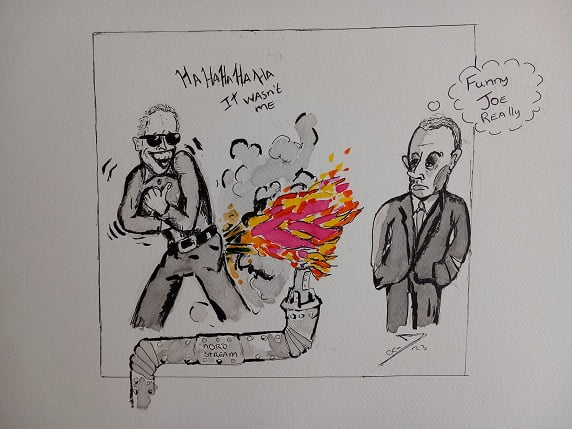
It is clear to the world that the Biden Administration blew up the NATO alliance by sabotaging the Nord Stream pipelines. Biden played a double role in Europe by provoking Moscow and escalating the war in Ukraine. Despite that, Russian President Vladimir Putin does not seem to care to respond. With an incompetent and dead NATO alliance, a coalition of convenience between Russia and China is emerging that could endanger the whole western world.
By Arthur Blok & Nikola Mikovic
“A nuclear war cannot be won and must never be fought.” Presidents Ronald Reagan and Mikhail Gorbachev made this statement at their summit in Geneva in 1985.
The statement was part of a larger declaration announcing that the countries had agreed on an ongoing process of dialogue to reduce nuclear risks and promote non-proliferation and disarmament.
It paved the way for vital arms control treaties between the two countries, such as the Strategic Arms Reduction Treaty (START) and the Intermediate-range Nuclear Forces (INF) Treaty. It acted as a valuable confidence-building measure between two former foes, ended the Cold War tensions, and sent the public a clear and powerful message about their government’s intentions.
That historical agreement is now void.
Putin announced this week that Russia would suspend its participation in the New Strategic Arms Reduction Treaty. Soon after, the country’s Foreign Ministry said that Moscow would “continue to be committed to the restrictions on strategic offensive weapons under New START as long as it is in force”.
Was the Russian leader’s announcement yet another empty threat, or just a bluff like Biden’s statement in September that Putin blew up the Nord Stream gas pipelines?
The report of American veteran investigative journalist Seymour Hersh that the United States carried out the September 2022 bombing in a covert operation must have felt like a slap by the Biden Administration.
Doing so made it evident to the world that Washington betrayed the NATO alliance and endangered Western Europe’s energy supply and security.
When Donald Trump became president of the United States in 2016, none of his advisors and political analysts wanted to hear his views on foreign policy.
Let’s briefly look at what exactly his standpoints were on NATO. An alliance he questioned years after the fall of the Soviet Union. An alliance where most of its members did not pay their annual dues and relied entirely on American support.
Political opponents and mainstream media collectively told him to shut up.
But Trump was right again.
Why fight a war with Russia? It will only drive Putin into the hands of China, and the two countries could potentially create the most powerful anti-American and anti-western block in human history.
Just by asking this question, Trump was called a traitor by his opponents.
The same thing is happening now with politicians and commentators who call for an end to the escalation of the war rhetoric and an end to NATO supplying weaponry to the Ukrainian Armed Forces.
Russia, for its part, demands the withdrawal of all US-NATO military equipment from Ukraine, but Washington is extremely unlikely to stop arming the Eastern European country.
De-escalation is the only way forward, especially considering the following things. If Russia and China came closer, you would have a power block with the world’s largest landmass, gas reserve, population, and economy.
Russia-China axes would be the most powerful entity in the world. They could rule most of the world’s economy, trade routes, raw materials, and military power.
A power block so great it would be impossible to stop, not by NATO, not by any western entity.
Here are some disturbing facts: Chinese spending on Russian goods has increased by almost 60% in the past year alone, led by importing Russian coals for China’s energy plants. While automakers Ford and Toyota were forced out of Russia, Chinese automakers rapidly filled the vacuum.
China now makes roughly 30 per cent of cars in Russia, less than 10 per cent before the crisis erupted. The same is happening with other consumer goods.
At the same time, the Chinese yuan became the most traded currency on the Moscow Exchange. Before the crisis, this was less than 1 per cent.
Deep and growing economic ties that western mainstream media are unaware of.
Growing economic ties that could lead, in the future, to potential and military relations. That is something to consider by western leaders who opt for escalation instead of diplomacy.
What encourages the West to continue implementing its current geopolitical course could be that Russia has proved not to have any red lines. Even after it became apparent to the world that Washington was behind the blowing up of the Nordstream pipelines, the Kremlin continued burying its head in the sand.
In November, Serbian President Aleksandar Vucic said, “every politician in the world knows who committed sabotage in the Baltic Sea”.
"No politician in the world is ignorant of who committed sabotage in the Baltic, but we all pretend to be imbeciles and keep silent so as not to harm the interests of our countries. Hypocrisy is everywhere”, Vucic stressed.
Where is the outrage in Europe after the Seymour Hersh report?
Maybe we missed it.
Besides empty rhetoric, Moscow did not seem upset about the US actions either.
The Kremlin initially accused the United Kingdom of the Nord Stream pipeline explosions but did not take any actions against London. Now after Hersh accused Norway and the U.S. of involvement in the blasts and allegedly received the green light from Biden, Moscow insists that Washington has “questions to answer” over its role in explosions that destroyed the undersea Nord Stream gas pipelines.
In all fairness, they are right.
In reality, the US, as the only superpower, will never answer any questions from the Russian Federation since such a move would be interpreted as a sign of weakness. Even if Washington eventually openly admits that it is behind the Nord Stream blasts, there is nothing Russia can do to punish the United States.
Thus, although the sabotage in the Baltic Sea first and foremost harmed Europe in various ways, and it has yet again demonstrated that the U.S. still has significant leverage over the European Union and the Russian Federation.
But for how long?
With an incompetent and dead NATO alliance, growing diplomatic contacts and economic support between Russia and China, the whole western world is under serious threat.
A development that should worry every self-respecting policymaker and strategic planner in the west.






